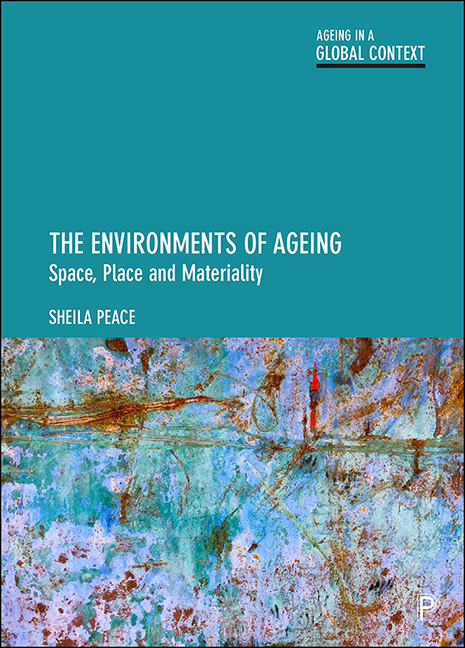Book contents
- Frontmatter
- Dedication
- Contents
- List of figures and tables
- Research summaries
- List of acronyms
- About the author
- Acknowledgements
- Series editors’ preface
- Preface: understanding the structure
- 1 Person and environment
- 2 Theoretical development
- 3 The global context
- 4 Environmental living
- 5 Housing in later life
- 6 Housing histories, housing options
- 7 Alternative environments: specialised housing (with care)
- 8 Care home living: a form of long-term care
- 9 Methodological development
- 10 Rethinking the spatiality of ageing
- Glossary of terms
- References
- Index
9 - Methodological development
Published online by Cambridge University Press: 15 September 2022
- Frontmatter
- Dedication
- Contents
- List of figures and tables
- Research summaries
- List of acronyms
- About the author
- Acknowledgements
- Series editors’ preface
- Preface: understanding the structure
- 1 Person and environment
- 2 Theoretical development
- 3 The global context
- 4 Environmental living
- 5 Housing in later life
- 6 Housing histories, housing options
- 7 Alternative environments: specialised housing (with care)
- 8 Care home living: a form of long-term care
- 9 Methodological development
- 10 Rethinking the spatiality of ageing
- Glossary of terms
- References
- Index
Summary
Introduction
This chapter returns to considering the ways in which environmental gerontologists address key issues. Although the earlier discussion of theoretical development in Chapter 2 did not detail a methodological approach, we are drawn here to the qualitative work of Gubrium, Rowles, Rubinstein and de Mederios, for example, who have developed ethnographic methods and phenomenological approaches that help us to understand the minute detail of everyday living in later life. Like other gerontologists in this field such as Oswald, Wahl, Chaudhury, Golant, Bernard and Burholt, the current author has experience of mixed methods research, in which indepth perspectives can be viewed within a bigger picture. This may include innovative measurement and the triangulation of data in analysis (see Kellaher et al, 1990; Mertens and Hess-Biber, 2012).
In addition, the approach to research here has been influenced by the author's colleagues at The Open University (OU) who have expertise in biographical studies, oral history and autobiographical writing (Johnson, 1978; Atkinson and Williams, 1990; Bornat, 1994, 2001; Holland, 2001; Bytheway, 2009, 2011). While these methods emerged through social history and sociology (Chamberlayne et al, 2000; Thompson, 2000), they underpinned the need for in-depth knowledge of personal narrative, leading in 1995 to the launch of the Centre for Ageing and Biographical Studies at the OU's then School of Health and Social Welfare. Through bringing these traditions together, this author has continued her interest in how environmental experience, both individual and group, can be understood through environmental biography and participatory research that is grounded in place. Consequently, the interaction between people and their environment requires continued consideration of context, three areas are studied: participatory methods involving older people within the research process; the effects on research practice of interdisciplinary and interprofessional study; and issues of measurement, through subjective, objective, conceptual and applied research, with potential for further translation. Figures are drawn from research fieldwork.
Participatory research: involving older people
In Chapter 2, the discussion of photo-walks, a joint approach between the older person and the researcher that facilitated non-representational theory (Barron, 2019) reminded this author of an earlier experience. During graduate studies in the mid-1970s, cognitive mapping of place was developed with older people in Swansea (Peace, 1977), influenced by Lynch (1960), Regnier (1974) and others.
- Type
- Chapter
- Information
- The Environments of AgeingSpace, Place and Materiality, pp. 235 - 262Publisher: Bristol University PressPrint publication year: 2022

